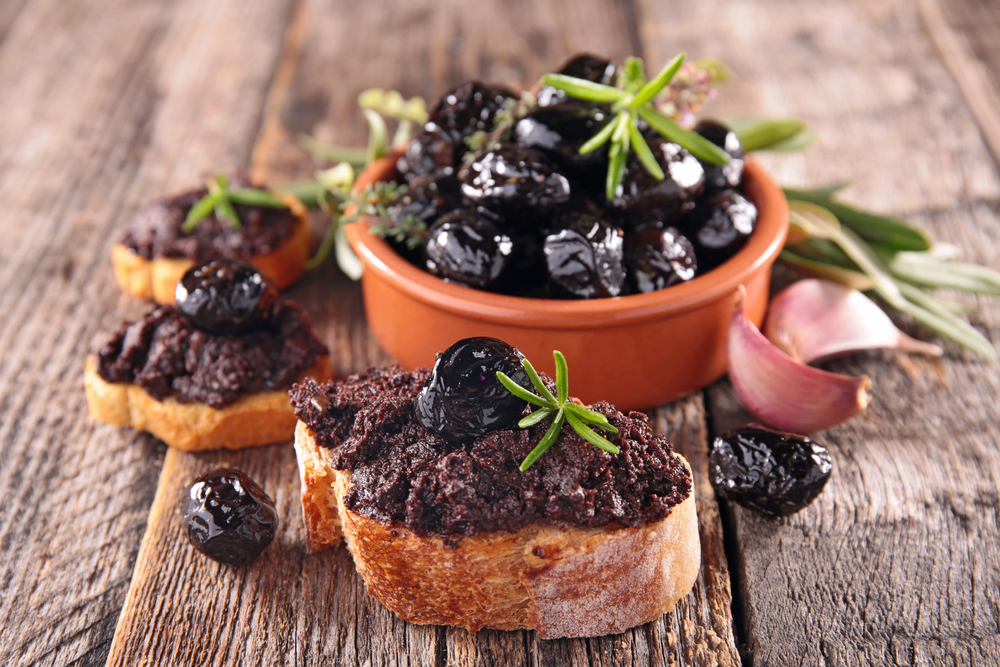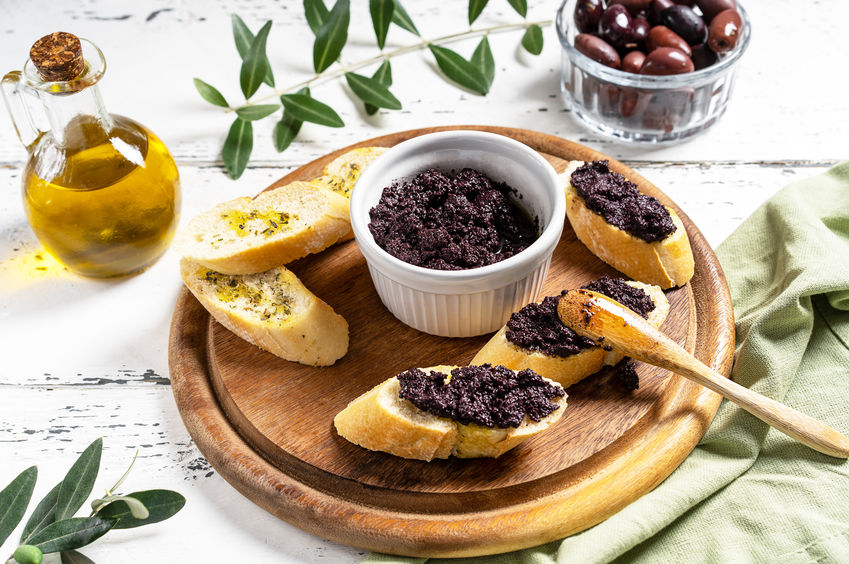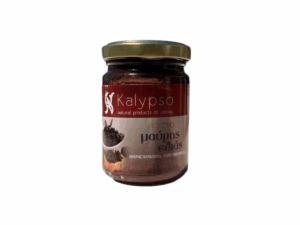Greek Tapenade: A Tasty Blend of Tradition and Flavor
Greek tapenade, famous for its rich taste and Mediterranean flavors, is much more than just a condiment. This traditional dish embodies the essence of Greek cuisine, featuring local ingredients such as Kalamata olives, capers and olive oil. Enjoyed as an aperitif or as a side dish, it reflects a culinary savoir-faire handed down from generation to generation. Discover the world of this Greek specialty, a true gastronomic treasure.
Its origin and history in Greece
Although often associated with Provence, tapenade has deep roots in Greece. The ancient Greeks, experts in preserving olives, were already using olive pastes in their diet. These pastes were often combined with other local products such as capers and olive oil. These ingredients, which were at the heart of their cuisine, gave rise to tapenade as we know it today.
The olive, a symbol of peace and prosperity since antiquity, occupies a central place in Greek culture. It is an integral part of the country’s agriculture and age-old traditions. Centuries-old olive groves, still present in many parts of Greece, bear witness to this heritage. By concentrating the essence of the olive, tapenade reflects the intimate relationship between the Greeks and their land, which is both nourishing and spiritual.
Today, tapenade remains a symbol of Greek hospitality. It is an essential part of any meal, a symbol of generosity, and is always prepared using local resources, particularly olives and olive oil, which are at the heart of Greek culinary culture.
The Key Ingredients of Greek Tapenade
The exceptional quality of the ingredients makes all the difference in a Greek tapenade.
Kalamata Olives
Plump and slightly sweet, they form the basis of this preparation. Grown under the Mediterranean sun, they add depth and character to tapenade thanks to their firm flesh and unique flavor.
The Capers
Hand-picked on the Greek islands, they add a tangy, salty touch. They are harvested on steep terrain, and natural drying preserves their distinctive flavor, reinforcing the tapenade’s authenticity.
Garlic
A staple of Greek cuisine, it enriches tapenade with a powerful flavor. In addition to its antiseptic and anti-inflammatory properties, local garlic contributes to Mediterranean tradition.
Extra Olive Oil
Often sourced from Crete, it binds these ingredients to create a paste with a smooth texture and balanced flavors. Rich in essential fatty acids and antioxidants, it harmonizes flavors and adds a natural sweetness to tapenade.
Regional variations of Greek Tapenade
Greek tapenade, like many other Mediterranean specialties, varies from region to region. Each area adds its own touch, influenced by local ingredients and specific culinary traditions.
In Crete
Black olives are preferred for their natural sweetness. The Cretans use fleshier, slightly sweeter olives, resulting in a tapenade that is milder in taste, but still rich and flavorful.
In the Peloponnese
Wild herbs such as thyme and oregano are often added. These local herbs, grown in ideal conditions, add a fresh, Mediterranean aroma, enhancing the richness of the tapenade’s taste.
On the island of Santorini
The addition of anchovies adds a maritime note, true to island cuisine. It’s a reminder of the importance of the Aegean Sea in local gastronomy, where the flavors of the sea blend harmoniously with products from the land.
Each region thus offers a unique version of tapenade, creating a diversity of tastes and textures that illustrate the exceptional variety of Greek cuisine.
Health benefits
Greek tapenade is not only delicious, it also offers numerous health benefits. Made from natural ingredients, it combines gustatory pleasure with nutrition.
Olives and Olive Oil
Rich in monounsaturated fatty acids, olives promote cardiovascular health. They help reduce bad cholesterol (LDL) and maintain a healthy lipid balance. Extra-virgin olive oil, meanwhile, boasts antioxidant and anti-inflammatory properties, reinforcing its benefits for the body.
The Capers
Excellent sources of antioxidants, capers help fight free radicals and protect cells from premature aging. They are also rich in flavonoids, beneficial for cellular health.
Garlic
In addition to its powerful taste, garlic has anti-inflammatory and antibacterial properties. It also supports the immune system, regulates blood pressure and helps prevent certain chronic diseases.
Vitamins and Minerals
Tapenade is rich in vitamins E and K, essential for healthy skin, eyes and bones. It also boosts the immune system thanks to its antioxidants.
Low Carb
Low in carbohydrates, tapenade is the perfect snack for those seeking to maintain a balanced diet.
How to enjoy Greek Tapenade: Recipes and Associations
Greek tapenade, with its wealth of flavors, adapts to many occasions and recipes. Its unique taste and creamy texture make it a versatile accompaniment, ideal for dishes from starters to main courses.
As an aperitif or starter
Traditionally, tapenade is served with toasted bread or raw vegetables.
Spread a thin layer of tapenade on slices of farmhouse bread or toasted baguette for a Mediterranean aperitif. You can also add a touch of goat’s cheese or crumbled feta for a creamy contrast.
Serve tapenade with crunchy vegetables such as cucumber slices, carrot sticks or peppers for a light, fresh aperitif.
Use tapenade as a garnish for olives, cherry tomatoes or small cubes of cucumber. You can also place it in small bowls for dipping.
Accompanying Meat Dishes
Tapenade enhances the flavor of grilled meats or meat sauces.
- Chicken fillet stuffed with tapenade
Score chicken fillets, then stuff them with a generous portion of tapenade before baking. The tapenade not only flavors the meat, but also creates a layer of intense flavor.
You can use tapenade as a marinade or garnish for grilled lamb chops. Its powerful, salty taste goes perfectly with lamb meat.
Apply a thin layer of tapenade to a piece of meat before pan-frying or grilling for a deeper, richer taste.
With fish and seafood
Tapenade is also excellent with fish dishes, adding a savory, salty touch.
Serve tapenade on grilled fish, such as sea bass or walleye. It enhances the flavor and contrasts nicely with the mild taste of the fish.
Spread a thin layer of tapenade on a salmon steak before cooking. You can also add it to grilled salmon as a garnish for a Mediterranean touch.
Add a teaspoon of tapenade to ceviche or fish tartare to intensify the aromas and balance the acidity of the citrus.
In Salads and Vegetarian Dishes
Tapenade goes perfectly with vegetarian dishes, adding umami flavor with ease.
Mix tapenade with tomatoes, olives, cucumber, peppers and a little feta cheese for a tangy Greek salad. Add capers and red onion for even more flavor.
Mix tapenade with hot or cold pasta. You can add grilled vegetables, such as zucchini, eggplant and peppers, for a tasty vegetarian dish.
Use tapenade as a garnish for stuffed vegetables, such as tomatoes, zucchinis or eggplants. You can mix the tapenade with rice and fresh herbs before filling the vegetables.
Modern recipes
Tapenade also integrates easily into more modern recipes, offering an innovative touch.
Mix tapenade with olive oil, balsamic or cider vinegar to create a tasty salad dressing.
Add a spoonful of tapenade to avocado toast for a Mediterranean take on this classic. Add cherry tomatoes and a little Espelette pepper for even more flavor.
Spread tapenade on wraps or sandwiches, then top with grilled vegetables, goat’s cheese or grilled chicken for a quick and tasty lunch.
Ideas for Garnishes and Accompaniments
Tapenade is perfect for adding flavor to simple dishes, while remaining a versatile accompaniment.
- Garnish for meat and fish
Use tapenade to garnish grilled meats, roasted fish or shellfish, adding a flavorful Mediterranean touch.
Spread the tapenade on crackers or pita toast for a light, refined snack.
Add tapenade to grilled vegetables such as eggplants, zucchinis or peppers to enhance the taste and add an extra dimension to your dishes.
The Greek Tapenade Artisanal Production Process
Greek tapenade is handcrafted using traditional methods that preserve the richness and quality of the ingredients. Here’s how this tasty preparation is made:
Selection and Preparation of Ingredients
Producers carefully select olives for their quality and ripeness. Kalamata-type olives are commonly used, but other local varieties are selected according to region. They pit the olives carefully to avoid damaging the flesh and preserve their unique taste.
Traditional grinding
Producers then crush the olives by hand or in a stone mortar. This method preserves their texture and extracts all their flavor. This step guarantees a smooth, yet slightly grainy paste, for a tapenade of ideal consistency.
Adding Other Ingredients
Once the olives have been reduced to a paste, capers, often hand-picked from the Greek islands, are added for their tangy, salty flavor. Garlic, an essential ingredient in Greek cuisine, then adds a savory, piquant note. These ingredients are added progressively to ensure that the flavors are evenly blended.
Incorporation of Olive Oil
To achieve the ideal consistency and bind the flavors together, a drizzle of extra-virgin olive oil is added. This oil, often locally sourced and renowned for its quality, adds not only texture, but also a depth of flavor that makes Greek tapenade so rich.
Mixing and refining
The mixture is carefully blended until it forms a homogeneous paste. Some recipes recommend resting the tapenade for a few hours to allow the flavors to develop and blend perfectly. This artisanal process guarantees a tapenade with an authentic, balanced taste, rich in natural flavors.
Storage and Packaging
Finally, tapenade is carefully preserved in glass or ceramic jars to maintain its freshness and quality. The use of airtight jars prolongs shelf life, while preserving aromas and texture.
This artisanal process, used in many Greek households, creates an authentic tapenade, reflecting know-how handed down from generation to generation. The use of quality ingredients and meticulous preparation guarantee an unrivalled end product, a true Mediterranean delight.
Differentiating an Artisanal Tapenade from an Industrial Tapenade
- Texture: Artisanal tapenade has a grainy texture, with visible olive pieces, offering an authentic mouthfeel. It retains a natural consistency, without being too smooth. An industrial version, on the other hand, is often too homogeneous, sometimes too thick or too fluid.
- Ingredients: Artisanal tapenade is made with natural, high-quality ingredients, such as local olives, fresh capers, garlic and extra-virgin olive oil. No preservatives or additives are used, guaranteeing a pure, authentic taste. Industrial tapenade, on the other hand, may contain thickeners, preservatives and inferior oils, sometimes even other vegetable fats.
- Olive oil: In artisanal tapenade, the olive oil is of the highest quality, sourced directly from local olive groves, and enhances the flavors. Industrial versions, on the other hand, often use less expensive oils, such as sunflower or rapeseed oil, which alter the taste and quality of the product.
So, for an authentic, tasty experience, always opt for an artisanal tapenade, prepared with fresh, natural ingredients, and avoid industrial versions, which are often less rich in flavor.
The Importance of the Olive in Greek Culture
The olive occupies a central place in Greek culture, symbolizing peace, prosperity and endurance since antiquity. It is at the heart of Greek agriculture and represents a heritage deeply rooted in the country’s traditions. The olive is also linked to Greek mythology, notably in the myth of Athena who, according to legend, offered the Athenians an olive tree, symbolizing wisdom and prosperity. This symbolism is still present in modern cultural practices, where the olive is used in religious rituals such as the blessing of olive branches on Palm Sunday.
Greece’s olive groves, often over a hundred years old, bear witness to this living heritage. In Crete, the Peloponnese and other islands, these olive groves are cultivated using traditional methods, guaranteeing olive oil of exceptional quality. Families pass on the secrets of this culture from generation to generation, and olive harvesting remains an important activity in many rural areas.
The olive is not just a culinary ingredient, it’s also an integral part of Greek daily life. Olive oil is essential in the preparation of many traditional dishes. It is also used in body care products, thanks to its moisturizing and nourishing properties. In Greece, the olive and its oil symbolize much more than a simple food product. They embody the soul of Mediterranean culture, a natural and spiritual heritage that can be found in every drop of olive oil and every olive tasted.
Greek Tapenade in the Modern Kitchen
Greek tapenade fits perfectly into modern cuisine, adding an authentic touch to contemporary dishes. It’s ideal for healthy snacks, such as crunchy vegetables, crackers or avocado toast. It also goes well with more elaborate recipes, such as pasta, pizza or grilled meats, creating unique flavor combinations.
As well as being a great accompaniment to aperitifs, Greek tapenade can easily be incorporated into innovative culinary creations. Mix it with sauces to add depth, or use it as a base for original vinaigrettes. Its creamy texture and well-balanced taste are equally suited to vegetarian dishes and richer fare.
Its ability to fuse tradition and modernity makes it a must for those who want to experiment with recipes while remaining connected to their Mediterranean roots. Greek tapenade is much more than a condiment; it has become a key element of contemporary cuisine, bringing authenticity and refinement to every dish.
Our Greek tapenades

















